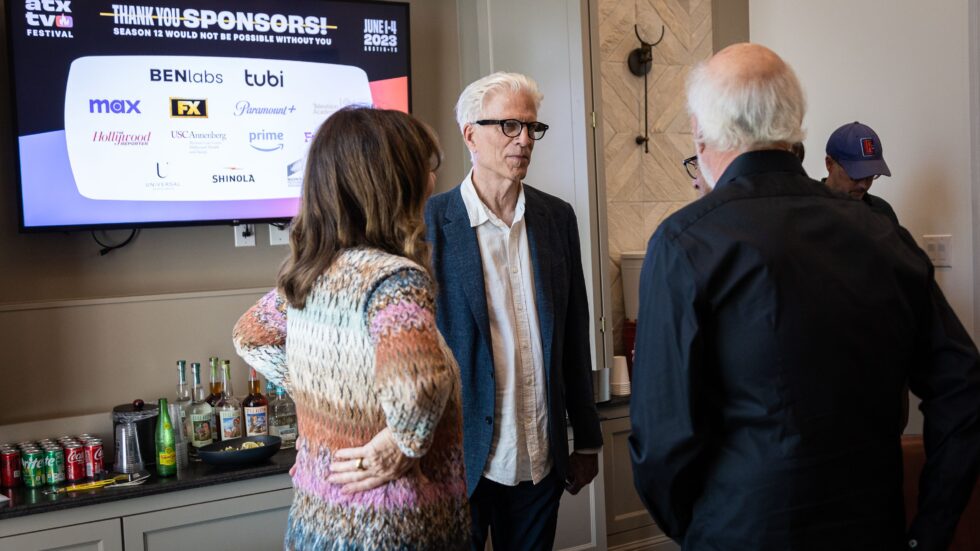This year’s ATX festival felt a little different due to the strike, as many showrunners and writers who would have been there to promote their series were unable to attend due to the compliance rules. That didn’t mean that the writers there on their own accord (because of their love of the festival) couldn’t talk about their work, careers, their craft, and of course the strike and the future of our business. Other creative department heads took advantage as well, showcasing Costume Designers, Casting Directors, Creative Execs, Heads of Development, and Music Supervisors among many across panels. Notably, in-person attendance (June 1-4) combined with virtual viewership (May 31-June 11) was a historic 4,000! With over 200 cast, crew, and creatives, 60 screenings, panels + conversations, 12 marquee events, and 8 venues across the 4 days in Austin, Season 12 was an incredible success.

PANEL: ARE THEY A GOOD PERSON?
With many brands hesitant on edgy content or flawed characters, this was a deep dive into why many of these shows and characters are resonating with audiences… think Succession and the despicable nature of all these characters that we can’t get enough of. Likeability and notability are two different things. Perhaps it’s the flawed nature of these characters, these situations and/or their anti-hero nature that makes them more human or more relatable to audiences. These work best with ensemble-type casts so you can pivot your allegiance throughout when behavior acts up. People are drawn to these characters and situations because they see themselves in them… no one is perfect, and nothing is perfect and it’s the flawed characters that people often find an emotional connection with. Something for brands to consider when looking at content and moments with those characters!
- Jacqueline Sacerio (Co-Head of Development E-One)
- Sarah Timberman (Executive Producer of Justified: City Primeval, Fleishman is in Trouble)
PANEL: AI AND US
This was an interesting panel around A.I because it was from the perspective of the creative community. Dr. Emilia especially felt that the pace of A.I. is moving too quickly and that we all need to take a 6-month pause to regulate it and understand how to control what is and isn’t used for good or evil. A.I. isn’t universally looked at as an enemy by writers and the creative community; they realize it’s a reality that is here. Some believe that it can still enhance how we tell stories, but not replace us; that it needs to be regulated and there needs to be systems and processes of the information it is using to create… because much of what they are using to create is copyrighted materials. A.I is only as good as the information you are feeding it but people should be compensated for their work that is being used to feed it. Things still require a human touch: a film, a series, a story is a reflection of choices that an artist makes to bring it to life… to give it context and perhaps A.I. can help streamline how that information is compiled or help us make better choices, but the choice needs to remain ours. We can’t lose the humanity that is storytelling because that is what emotionally draws us in to care. A.I. is coming and everyone needs to embrace it, but it needs to be regulated and it needs to be used in the right way… this continues to be a big point of the strike and the industry moving forward.
Javier had a great quote in the panel too, that “Magic is technology we don’t understand.” Kevin Bigley shared a story about Greg Daniels, who believes new technology is often introduced as a party trick – with a lead gimmick to get people excited & focused on one aspect… which can lead to either a lack of responsible capability usage or drive mass exploration. It’s on us to make sure we understand it, and adapt as needed, but make sure we are using it in the right way.
Alenda Smith emphasized that “the theft of intellectual property has already occurred”– responsible use, guardrails, credit (& payment) all rely upon getting transparency within the “black box” of how AI deciphers data, makes choices, and ultimately generates its outputs. Anticipate a wave of 3rd party vendors emerging to solve/service AI tools and aid in deciphering the data – the fear is that if it’s not profitable, then we’ll never know.
- Kevin Bigley (Actor, Upload)
- Dr. Emilia Javorsky (Future of Life Institute)
- Alenda Smith (Showrunner, Dickinson)
- Javier Grillo-Marxuach (EP, Writer, Cowboy Bepop)
PANEL: Queer Stories We Want To See
Audiences are hungry for LGTBQ+ stories and characters that are as complex, frustrating, joyful, funny, romantic, and dark as any other. Queer audiences have been trained (historically) as viewer nomads – going from show to show to seek representation and reflection of themselves. Queer projects face the challenge of being required to have a big tent to represent all and queer audiences are expected to be loyal and support it (even when the production may not be very good). Mid-budget horror projects are leading places for creativity, original ideas, and true diversity right now. When discussing what’s needed to be shown on-screen next, panelists all agreed we need to depict “Pleasure Activism” by centering storytelling in joy… even when the world around the characters is crumbling. While gains have been made on-screen, there is still tremendous work to be done balancing the scales in the executive suite to ensure decisions are being made authentically – which includes much-needed diversity off-screen.
- Caitlin Stasey (actress, Neighbors, Smile)
- Joel Kim Booster (actor/writer, Fire Island, The Other Two)
- Jerrie Johnson (actress, Harlem)
- Brian Michael Smith (actor, 911 Lone Star, The L Word: Generation G)
- Maureen Ryan (Vanity Fair moderator)
PANEL: WGA STRIKE PANEL
This panel was added to the festival after several panels had to be canceled when writers being brought to the festival by their studios to promote their productions were no longer able to attend due to strike compliance. That didn’t mean that the writers there on their own accord couldn’t talk about their work, careers, their craft, and of course this incredible turning point in our industry and the demands the WGA is making to protect their membership and the future of our business. The big and tangible highlight: the WGA is mad and the writers have reached a breaking point. They credit the younger generations, the millennials and the Gen Z cohort who entered the industry expecting to be able to make a sustainable living, and rising up to fight for basic labor protections. These seasoned showrunners were speaking on behalf of the WGA, as they have reaped benefits in their careers that are no longer accessible and they’re striking to protect those whose careers are on their way up.
Some of the main issues include ensuring writers get opportunities to be on set, to learn the intricacies of production and giving them important knowledge as they grow and become showrunners. Room size is also an important strike point. Iwinski used an NBA analogy when discussing the issue of mini-rooms. “What if we just had like two all-stars and they did the whole game?”, he said. “They’ll just have the ball they can pass to each other and everyone else is going, ‘What is happening?’ That’s what’s happening with staff size is they’re going, ‘Well, what if these two all-star writers just write all the episodes?’ If you’re a really important white dude, you can go, ‘Yeah, whatever’ or ‘No, I want six writers.’ If you’re a lower level or mid-level writer or a woman or person of color or a woman of color, and you go, ‘Actually they need six writers,’ they’ll just say no because the white guy didn’t need them so you don’t need them. That is why we are fighting to the death for [room sizes].”
Ultimately this strike is about the integrity of our business, which is why these conversations are so important and why this moment is so pivotal.
- Julie Plec (The Vampire Diaries, Girls on the Bus)
- Zoanne Clack (Station 19, Grey’s Anatomy)
- Greg Iwinski (Last Week Tonight w/ John Oliver, The Late Show with Stephen Colbert)
- Beau Willimon (moderator/showrunner )
Special thanks to the BENlabs staff who contributed to this article.


